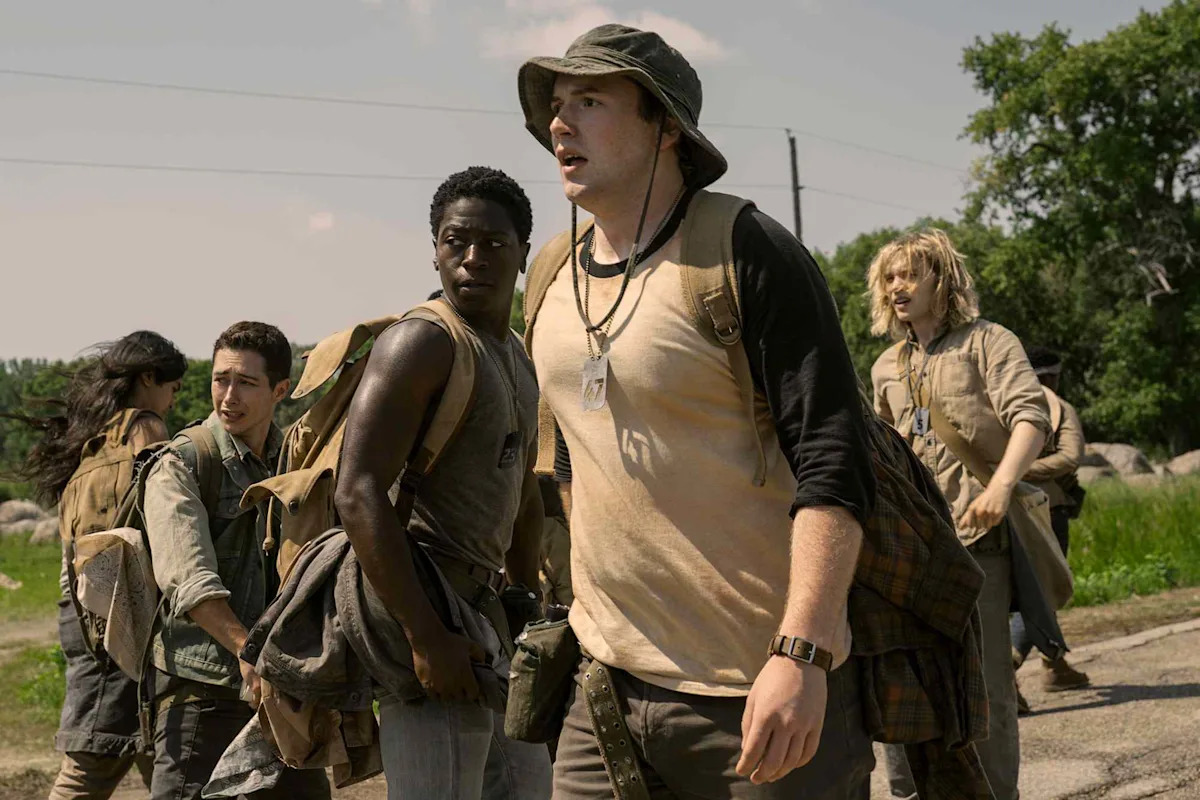
Director breaks down the Stephen King-approved book-to-movie changes
This article contains spoilers from The Long Walk.
The ending of The Long Walk, Hunger Games director Francis Lawrence‘s Stephen King movie adaptation, takes a major departure from the source material, the horror best-seller’s 1979 novel.
“There’s a switch at the end as to who survives that’s so big I thought, ‘Uh oh!,'” actor Mark Hamill, who stars as totalitarian figure the Major, tells Entertainment Weekly when thinking back to his reaction. “And it turns out, Stephen King loved it! … But I was nervous because it’s not easy when you make a decision that doesn’t slavishly follow exactly the way the book was.”
The general premise of the book carries over to the movie. In a dystopian vision of America where the country is run by a dictatorship, a group of young men gather for an annual competition called the Long Walk. All must maintain a constant pace of at least 3 miles per hour until there’s only one man left standing, and anyone who falls behind is promptly executed after three warnings.
As Hamill says, it’s at the very end of this taxing contest that the film takes its biggest leap from King’s original version of the tale. Lawrence tells EW separately that change, regarding who survives, was written in the script by J.T. Mollner (Strange Darling, Outlaws and Angels).

Murray Close/Lionsgate
Francis Lawrence on set with Cooper Hoffman and David Jonsson in ‘The Long Walk’
“As J.T. started working through it, after we had talked about it initially, he had a couple of great ideas,” Lawrence reflects. “One was we decided to strip away the girlfriend from Raymond Garraty.” Garraty’s early motivation to keep trekking along the Long Walk is to make it to the nearby town where his girlfriend, Jan, would be waiting to cheer him on. The character in the film, played by star Cooper Hoffman, instead focuses more on his mother, played by Judy Greer.
“J.T. had a new idea on backstory, which was that the Major had done something to his family,” Lawrence continues, “and he had these different motives for going into the Long Walk, which I really liked.” In the context of the film, the Major pulls Garraty’s father out of their home in the middle of the night and guns him down in the street for upholding “illegal” beliefs. The trauma compels Garraty to seek revenge by winning the Long Walk to get close enough to kill the Major.
“Then we also decided to switch who wins,” Lawrence adds.
Who wins the Long Walk in Stephen King’s book?

Murray Close/Lionsgate
Mark Hamill as the Major in ‘The Long Walk’
The original material leaves us with Garraty, Peter McVries, and Stebbins as the last three walkers. Garraty tries to save his buddy, McVries, who ultimately decides to sit down peacefully and accept his fate.
That leaves Garraty and Stebbins to fight it out for the victor’s title. The latter feels like the inevitable winner, while Garraty loses himself more and more to delirium. He catches up to Stebbins if only to say he’s voluntarily giving up, but Stebbins unexpectedly drops dead. It isn’t explicitly explained what happened, but it seems his body succumbed to the physical strain of all they endured.
Garraty can’t enjoy his win, however, as his attention becomes focused on a mysterious dark figure he sees in the distance, one he describes as almost familiar to him in some regards. He ignores the Major, who arrives to award him his winnings, and sprints off towards this apparition.
It’s still these three finalists at the end of Lawrence’s movie adaptation, though now Stebbins (Garrett Wareing) dies before the other two. Garraty also successfully convinces McVries (David Jonsson) to carry on instead of opting out, but then, behind his back, Garraty is the one who sits down and accepts his execution.
McVries decides to carry out Garraty’s plan. For his winnings, he asks for a gun from one of the soldiers and uses it to kill the Major. He then walks off alone down the road, seemingly to nowhere in particular.
Behind the book-to-movie ending change

Murray Close/Lionsgate
Tut Nyuot, Ben Wang, Jordan Gonzalez, Charlie Plummer, Joshua Odjick, Cooper Hoffman, and David Jonsson in ‘The Long Walk’
Lawrence details why he liked this change to the story.
“You don’t really want the guy who’s in it for vengeance to win, right? Because that’s really not what the story’s about,” he says. “And I knew that people were really gonna love McVries. What I also loved about it was, just narratively, the idea that we open on a kid in a car and the audience is gonna be programmed to believe, clearly, here’s our winner. I love turning that on its head and going, ‘Guess what?! He’s not the winner.'”
Ultimately, Lawrence saw The Long Walk as the story of Garraty and McVries, and this “shared self-sacrifice” they have. Having shot the film chronologically to track the wear and tear of his actors, the director saw in real time this character relationship building.
“This idea that McVries was gonna sacrifice himself because he loves Garraty so much, and that Garraty ends up sacrificing himself because he believes McVries is the one that’s worthy of winning, that kind of shared experience, I thought, was really emotional,” Lawrence remarks.

Murray Close/Lionsgate
Cooper Hoffman and David Jonsson as Garraty and McVries in ‘The Long Walk’
Want more movie news? Sign up for Entertainment Weekly‘s free newsletter to get the latest trailers, celebrity interviews, film reviews, and more.
This change was the team’s “big fingers crossed moment” because they knew they had to send it through to King, who serves as an executive producer on the movie. “Luckily, he really liked the ending, I think, because we stayed true to its spirit,” the director says. “I think he was willing to go for it.”
Lawrence essentially had no direct contact with King until the very end of the process. The author approved of him directing and of the screenplay, but that was about it. After they sent a cut of the finished film, Lawrence finally received a call from the man himself.
“What I loved the most about my conversation with him was just hearing how special it was to see it, because he had written it so long ago when he was so young,” Lawrence recalls. “He mentioned that he started it in high school and mostly to impress some girl, and that he really rarely revisits his stuff. So to be able to see something, nearing the end of his career, that he started ‘pre-career’ — I think was the term he used — was really special for him.”
The Long Walk is now playing in theaters.
Read the original article on Entertainment Weekly



